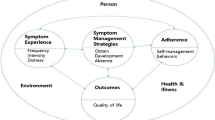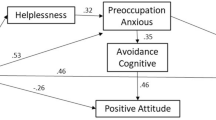Abstract
We examined the course and the prevalence of a high fear of cancer recurrence (FCR) in patients undergoing allogeneic PBSC transplantation (hematopoietic SCT (HSCT)) before HSCT (N=239), 100 days after (n=150, and 12 months after allogeneic HSCT (n=102). The Fear of Progression Questionnaire-Short Form (FoP-Q-SF), the EORTC Quality of Life Questionnaire, and the Hospital Anxiety and Depression Scale were used. Pre-HSCT 36% of patients, 100 days after HSCT 24% of patients, and 1 year after HSCT 23% of patients fulfilled the criteria for high FCR (FoP-Q-SF cutoff=34). Being married (b=2.76, P=0.026), female gender (b=4.45, P<0.001) and depression (b=4.44, P<0.001) were significantly associated with FCR at baseline. One hundred days after HSCT, depression significantly predicted FCR (b=6.46, P<0.001). One year following HSCT, female gender (b=6.61, P=0.008) and higher depression were (b=4.88, P=0.004) significant predictors for FCR. Over the three assessment points, patients with high FCR had a significantly lower quality of life compared to patients with low FCR in physical functioning (P=0.019), role functioning (P=0.003), emotional functioning (P<0.001), cognitive functioning (P=0.003), social functioning (P<0.001) and global quality of life (P<0.001). Our data provide evidence that FCR is a prevalent problem in patients with hematological malignancies and has a significant adverse impact on health-related quality of life.
This is a preview of subscription content, access via your institution
Access options
Subscribe to this journal
Receive 12 print issues and online access
$259.00 per year
only $21.58 per issue
Buy this article
- Purchase on Springer Link
- Instant access to full article PDF
Prices may be subject to local taxes which are calculated during checkout

Similar content being viewed by others
References
WHO (World Health Organization). Cancer mortality can be found at http://www.who.int/en (accessed 3 February 2012).
WHO (World Health Organization). Are the number of cancer cases increasing or decreasing in the world? http://www.who.int/features/qa/15/en/index.html (accessed 14 February 2012).
Simard S, Savard J, Ivers H . Fear of cancer recurrence: specific profiles and nature of intrusive thoughts. J Cancer Surviv 2010; 4: 361–371.
Vickberg SMJ . The Concerns About Recurrence Scales (CARS): a systematic measure of women’s fears about the possibility of breast cancer recurrence. Ann Behav Med 2003; 25: 16–24.
Christ JV, Grunfeld EA . Factors reported to influence fear of recurrence in cancer patients: a systematic review. Psychooncology 2013; 22: 978–986.
Mehnert A, Berg P, Henrich G, Herschbach P . Fear of cancer progression and cancer-related intrusive cognitions in breast cancer survivors. Psychooncology 2009; 18: 1273–1280.
Herschbach P, Berg P, Waadt S, Duran G, Engst-Hastreiter U, Henrich G et al. Group psychotherapy of dysfunctional fear of progression in patients with chronic arthritis or cancer. Psychother Psychosom 2010; 79: 31–38.
Lee-Jones C, Humphris G, Dixon R, Hatcher MB . Fear of cancer recurrence–a literature review and proposed cognitive formulation to explain exacerbation of recurrence fears. Psychooncology 1997; 6: 95–105.
Lengacher CA, Shelton MM, Reich RR, Barta MK, Johnson-Mallard V, Moscoso MS et al. Mindfulness based stress reduction (MBSR(BC)) in breast cancer: evaluating fear of recurrence (FOR) as a mediator of psychological and physical symptoms in a randomized control trial (RCT). J Behav Med 2014; 37: 185–195.
Mehnert A, Koch U, Sundermann C, Dinkel A . Predictors of fear of recurrence in patients one year after cancer rehabilitation: a prospective study. Acta Oncol 2013; 52: 1102–1109.
Lebel S, Tomei C, Feldstain A, Beattie S, McCallum M . Does fear of cancer recurrence predict cancer survivors' health care use? Support Care Cancer 2013; 21: 901–906.
Savard J, Ivers H . The evolution of fear of cancer recurrence during the cancer care trajectory and its relationship with cancer characteristics. J Psychosom Res 2013; 74: 354–360.
De Vries J, Den Oudsten BL, Jacobs PM, Roukema JA . How breast cancer survivors cope with fear of recurrence: a focus group study. Support Care Cancer 2014; 22: 705–712.
Thewes B, Bell ML, Butow P, Beith J, Boyle F, Friedlander M et al. Psychological morbidity and stress but not social factors influence level of fear of cancer recurrence in young women with early breast cancer: results of a cross-sectional study. Psychooncology 2013; 22: 2797–2806.
Thewes B, Bell ML, Butow P . Fear of cancer recurrence in young early-stage breast cancer survivors: the role of metacognitive style and disease-related factors. Psychooncology 2013; 22: 2059–2063.
Scherwath A, Schirmer L, Kruse M, Ernst G, Eder M, Dinkel A et al. Cognitive functioning in allogeneic hematopoietic stem cell transplantation recipients and its medical correlates: a prospective multicenter study. Psychooncology 2013; 22: 1509–1516.
Mehnert A, Herschbach P, Berg P, Henrich G, Koch U . Fear of progression in breast cancer patients—validation of the short form of the Fear of Progression Questionnaire (FoP-Q-SF). Z Psychosom Med Psychother 2006; 52: 274–288.
Aaronson NK, Ahmedzai S, Bergman B, Bullinger M, Cull A, Duez NJ et al. The European Organization for Research and Treatment of Cancer QLQ-C30: a quality-of-life instrument for use in international clinical trials in oncology. J Natl Cancer Inst 1993; 85: 365–376.
Zigmond AS, Snaith RP . The hospital anxiety and depression scale. Acta Psychiatr Scand 1983; 67: 361–370.
Ghazali N, Cadwallader E, Lowe D, Humphris G, Ozakinci G, Rogers SN . Fear of recurrence among head and neck cancer survivors: longitudinal trends. Psychooncology 2013; 22: 807–813.
Ernst J, Peuker M, Schwarz R, Fischbeck S, Beutel ME . Long-term survival of adult cancer patients from a psychosomatic perspective - literature review and consequences for future research. Z Psychosom Med Psychother 2009; 55: 365–381.
Crist JV, Grunfeld EA . Factors reported to influence fear of recurrence in cancer patients: a systematic review. Psychooncology 2013; 22: 978–986.
van den Beuken-van Everdingen MH, Peters ML, de Rijke JM, Schouten HC, van Kleef M, Patijn J . Concerns of former breast cancer patients about disease recurrence: a validation and prevalence study. Psychooncology 2008; 17: 1137–1145.
Mehta SS, Lubeck D, Pasta DJ, Litwin MS . Fear of cancer recurrence in patients undergoing definitive treatment for prostate cancer: results from CaPSURE. J Urol 2003; 170: 1931–1933.
Janz NK, Hawley ST, Mujahid MS, Griggs JJ, Alderman A, Hamilton AS et al. Correlates of worry about recurrence in a multiethnic population-based sample of women with breast cancer. Cancer 2011; 117: 1827–1836.
Simard S, Thewes B, Humphris G, Dixon M, Hayden C, Mireskandari S et al. Fear of cancer recurrence in adult cancer survivors: a systematic review of quantitative studies. J Cancer Surviv 2013; 7: 300–322.
Arès I, Lebel S, Bielajew C . The impact of motherhood on perceived stress, illness intrusiveness and fear of cancer recurrence in young breast cancer survivors over time. Psychol Health 2014; 29: 651–670.
Koch L, Bertram H, Eberle A, Holleczek B, Schmid-Höpfner S, Waldmann A et al. Fear of recurrence in long-term breast cancer survivors-still an issue. Results on prevalence, determinants, and the association with quality of life and depression from the Cancer Survivorship-a multi-regional population-based study. Psychooncology 2013; 23: 547–554.
Connell S, Patterson C, Newman B . Issues and concerns of young Australian women with breast cancer. Support Care Cancer 2006; 14: 419–426.
Hefner J, Kapp M, Drebinger K, Dannenmann A, Einsele H, Grigoleit GU et al. High prevalence of distress in patients after allogeneic hematopoietic SCT: fear of progression is associated with a younger age. Bone Marrow Transplant. 2014; 49: 581–584.
Judd LL, Rapaport MH, Paulus MP, Brown JL . Subsyndromal symptomatic depression (SSD): a new mood disorder? J Clin Psychiatry 1994; 55: 18–28.
Judd LL, Paulus MP, Wells KB, Rapaport MH . Socio-economic burden of subsyndromal depressive symptoms and major depression in a sample of the general population. Am J Psychiatry 1996; 153: 1411–1417.
Judd LL, Akiskal HS, Paulus MP . The role and clinical significance of subsyndromal depressive symptoms (SSD) in unipolar major depression. J Affect Disord 1997; 167: 6–10.
Judd LL, Akiskal HS, Maser JD, Zeller PJ, Endicott J, Coryell W et al. A prospective 12-year study of subsyndromal and syndromal depressive symptoms in unipolar major depressive disorders. Arch Gen Psychiatry 1998; 55: 694–700.
Capuron L, Ravaud A, Miller AH, Dantzer R . Baseline mood and psychosocial characteristics of patients developing depressive symptoms during interleukin-2 and/or interferon-alpha cancer therapy. Brain Behav Immun 2004; 18: 205–213.
Sarkar S, Sarkar R, Berg T . Sadness and mild cognitive impairment as predictors for interferon-alpha induced depression in patients with hepatitis C. Br J Psychiatry (in press).
Hart SL, Latini DM, Cowan JE, Carroll PR . CaPSURE Investigators. Fear of recurrence, treatment satisfaction, and quality of life after radical prostatectomy for prostate cancer. Support Care Cancer 2008; 16: 161–169.
Herschbach P, Book K, Dinkel A, Berg P, Waadt S, Duran G et al. Evaluation of two group therapies to reduce fear of progression in cancer patients. Support Care Cancer 2010; 18: 471–479.
Acknowledgements
This study was supported by grants from the German José Carreras Leukemia Foundation (grant nos. DJCLS R 04/29pf and DJCLS R 07/37pf).
Author information
Authors and Affiliations
Corresponding author
Ethics declarations
Competing interests
The authors declare no conflict of interest.
Rights and permissions
About this article
Cite this article
Sarkar, S., Scherwath, A., Schirmer, L. et al. Fear of recurrence and its impact on quality of life in patients with hematological cancers in the course of allogeneic hematopoietic SCT. Bone Marrow Transplant 49, 1217–1222 (2014). https://doi.org/10.1038/bmt.2014.139
Received:
Revised:
Accepted:
Published:
Issue Date:
DOI: https://doi.org/10.1038/bmt.2014.139
This article is cited by
-
Patient-reported cognitive function among hematopoietic stem cell transplant and cellular therapy patients: a scoping review
Quality of Life Research (2023)
-
What is known about palliative care in adult patients with allogeneic stem cell transplantation (allo-SCT)?
Annals of Hematology (2021)
-
Anxiety, depression, and mental health-related quality of life in survivors of pediatric allogeneic hematopoietic stem cell transplantation: a systematic review
Bone Marrow Transplantation (2020)
-
Testing a model of fear of cancer recurrence or progression: the central role of intrusions, death anxiety and threat appraisal
Journal of Behavioral Medicine (2020)
-
Fear of disease progression in adult ambulatory patients with brain cancer: prevalence and clinical correlates
Supportive Care in Cancer (2019)



